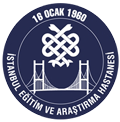ABSTRACT
Objectives:
We aimed to evaluate the demographic and clinical properties and the current medical treatments of the patients followed as rheumatoid arthritis (RA).
Methods:
153 patients diagnosed and followed up as RA in our outpatient clinics between 2006 and 2008 were enrolled in this study. We reviewed the patient files retrospectively. The demographic properties were assessed. Visual Analog Scale (VAS) for pain, Patient’s and Doctor’s Global Assessments, Steinbrocker Functional Staging, Health Assessment Questionnaire (HAQ), and erythrocyte sedimentation rate (ESR), C-reactive protein (CRP) and rheumatoid factor (RF) levels were analyzed. Radiologic evaluation was done to investigate joint erosion, and if positive, radiologic staging was done as well. Evaluation of the disease activity was performed by Disease Activity Score (DAS-28) instrument.
Results:
126 (82.4%) women and 27 (17.6%) men (totally 153 patients) were enrolled in the study. The mean age was 52.02±11.6 (11-86) years (49.9±11.57 years for women and 56.25±10.5 for men). The mean duration of disease was 6.47±6.29 (0-30) years. Extraarticular involvement like vasculitis and subcutaneous nodules was found in 6.5%. 18.3% of the patients had comorbid diseases (cardiovascular diseases, diabetes mellitus). The result of radiologic evaluation showed presence of radiologic erosion in 37.9%. 56.8% of the patients were receiving monotherapy (1 disease- modifying anti-rheumatic drug [DMARD]), and the most frequently used drug was methotrexate (30.7%). Two DMARDs or anti-tumor necrosis factor (TNF) combination therapy was used in 34.9% of the patients, while 2.1% of patients received three DMARDs and 1.4% received only anti-TNF therapy. According to the analysis results, there was a statistically significant relation between the DAS-28 and radiologic stage, erosion presence and HAQ scores (p<0.05).
Conclusion:
Female to male ratio was 4.6 in this study. We found a statistically significant correlation between DAS- 28 and HAQ scores and also between radiologic stage and HAQ score. We did not detect a statistically significant relation between DAS-28 scores and gender or age.



